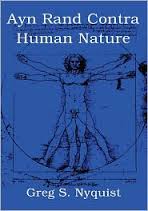I have had somewhat ambiguous feelings about Ayn Rand and her philosophy of Objectivism ever since I first discovered her in college. I agree with much of what she had to say: freedom, capitalism, and the use of reason are good; tyranny, socialism, and living off others are bad. Nevertheless, I have always felt vaguely repelled by her writings. Perhaps it is because I feel a slight malevolence underlying much of what she wrote. Ayn Rand was never one to forgive an enemy or maintain a friendship with someone of an opposing philosophy. Maybe the figures in her fiction are not much like real human beings. The heroes are completely good with no flaws, the villains completely evil with no redeeming characteristics. I am sure.
It is for that reason that I read Greg Nyquist’s Ayn Rand Contra Human Nature. Mr. Nyquist is a critic of Ayn Rand, but he takes a different approach than most of her critics. He does not spend much time examining the details of her philosophy, except to note where Objectivism is contradictory or incomplete. He does not refute Objectivism on a philosophical basis. In fact, at some points he concedes, for the sake of argument, that Objectivism is the most ideal philosophy imaginable. He also does not criticize Ayn Rand on a personal basis, except to show where her personality characteristics shaped Objectivism.
What Greg Nyquist does instead is ask whether Ayn Rand and Objectivism actually works. Mr. Nyquist does not have much use for windy speculations about metaphysics or wordy conjectures about the way things ought to be. He is a practical man. He wants to know whether the assumptions about humanity and the world made by Ayn Rand that form the basis of Objectivism are actually in accordance with the observed facts. To this end, he has written Ayn Rand Contra Human Nature.
This book is divided into eight chapters, each chapter dealing with some aspect of Ayn Rand’s philosophy, her theories of human nature, history, epistemology, metaphysics, ethics, politics, and aesthetics. The final chapter considers the future of Objectivism. It should not be a surprise that Nyquist finds Ayn Rand’s theories wanting. In particular, he criticizes her ideas on human nature as being unrealistic. She was more concerned with human beings as she believes they ought to be rather than how they really are. She believed that human nature can be changed and that the widespread acceptance of Objectivism will cause people to think and act more rationally. Ayn Rand argued that people act according to the fundamental premises of their particular philosophy and if that philosophy is changed from one that accepts mysticism and collectivism to one that follows reason and individualism, then we can create a utopia of reason and capitalism. Nyquist disagrees, noting that human nature has changed little, if at all, throughout the centuries. People do not often follow a consistent philosophy. They act according to desires and interests and adapt their personal philosophy to justify their actions. He notes that history is less the result of various philosophical and ideological movements, as Ayn Rand asserted, but is more influenced by people’s desires and interests, particularly those of the ruling class. There is a lot more to his criticism, but the general idea is that Ayn Rand simply did not seek any sort of empirical verification of her ideas. She preferred to think about things rather than go out and see how things really are.
On the whole, I agree with Greg Nyquist’s criticism. I think that after some point, Ayn Rand lived in an imaginary world with John Galt and Howard Roarke. I have noticed in her nonfiction, she tended to refer to or quote her characters as if they were real people. She tends to make assertions that are completely reasonable and logical, but with she seldom presents actual evidence that these assumptions are true. I have also found her knowledge of history to be shallow.
While Greg Nyquist presents himself as a practical man, he sometimes crosses into cynicism. He seems to have a very negative opinion on human nature and regards politics as nothing more than the elite getting their way. While this is all true, it is not the whole truth. He believes that even if Ayn Rand’ s ideal of laissez-faire capitalism and the minimalist state is the best system possible, they will never come about into actuality because no political/economic elite will allow them to. Ayn Rand and her followers are idealists who fight for a cause no pragmatic politician would waste his time with.
In the end, I am going to side with the idealists. The idealist will sometimes bring about needed change because he doesn’t know it is impossible and even if he fails, he can at least push things in the right direction. The practical man knows it is impossible and so doesn’t bother to try.
Related articles
- Ayn Rand & Objectivism (nrhatch.wordpress.com)
- Dave Brat Runs A $500,000 Program To Push Ayn Rand’s Ideas At College (talkingpointsmemo.com)
- The Predictive Power of Philosophy: AYN RAND on THE FUTURE (varight.com)
- Christopher Hitchens Destroys Ayn Rand (danielmiessler.com)
- Ayn Rand’s Words Live On (libertarianhome.co.uk)

